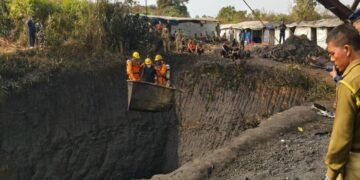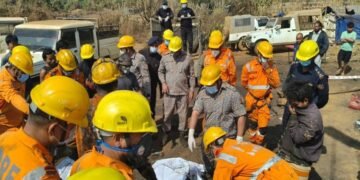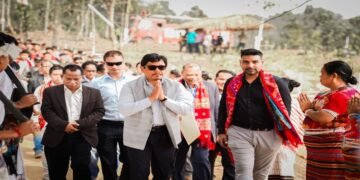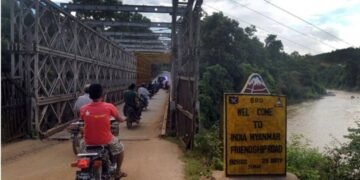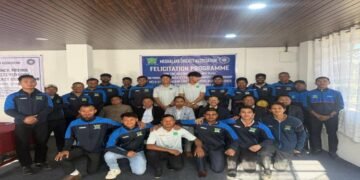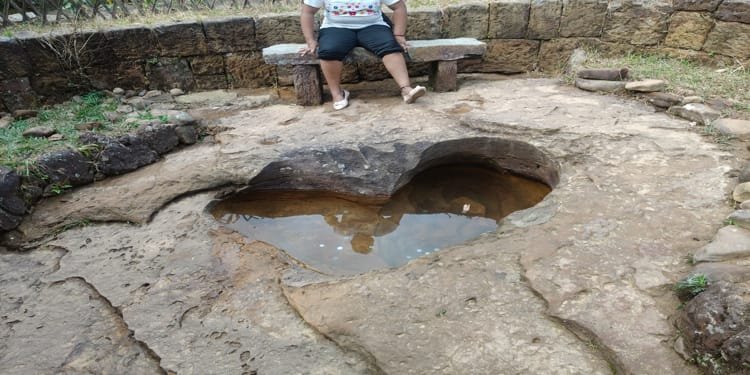Sohra (Meghalaya), Oct 28: As I ventured into the lush hills of Sohra, I stumbled upon a treasure trove of natural wonders, rich culture, and warm hospitality. My destination was U Maw Khyllung, a lesser-known paradise nestled in the eastern part of Sohra.
The journey began with a scenic drive through winding roads, flanked by majestic hills and valleys. As I ascended, the landscape transformed into a tapestry of emerald, green, with towering trees and sparkling waterfalls.
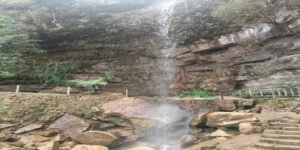
Upon arrival, I was greeted by the warm smiles of the local Khasi community. Their traditional huts, adorned with intricate bamboo carvings, stood as testaments to their rich cultural heritage. I marveled at the ancient monoliths, silently telling stories of a bygone era.
As I explored U Maw Khyllung, I discovered a symphony of natural wonders with waterfalls cascading down rugged hills, creating misty veils that danced in the sunlight, ancient limestone caverns, hiding secrets of the earth and Lush valleys, green expanses, cradling the gentle rustle of leaves.
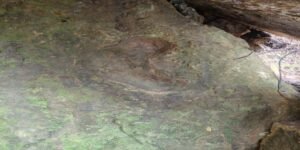
I ventured into the heart of Sohra’s natural wonders, exploring the Dohnid Caves, also known as the “Womb Caves.” These ancient limestone caverns, some of which are still intact, were believed to represent the womb of the earth. The Khasis considered these caves sacred, symbolizing the cycle of life, death, and rebirth. As we navigate the narrow passages, we’re struck by the eerie resemblance to a human womb, a testament to the Khasis’ profound understanding of natural symbolism.

U Maw Khyllung is considered a sacred site, believed to possess spiritual energy that nurtures life. The lush surroundings of U Maw Khyllung symbolize fertility and abundance, reflecting the Khasi values of family and community. The site is also believed to be inhabited by ancestral spirits, watching over the unborn child and guiding the mother.
Khasis believe that life is sacred from conception and the fetus is considered a spiritual being, growing under the guidance of ancestors. The community participates in rituals and ceremonies to ensure a healthy pregnancy and childbirth.

U Maw Khyllung has long been revered for its sacred springs and medicinal properties. Locals and visitors alike flock to this natural haven to rejuvenate and revitalize. The water sourced from U Maw Khyllung’s natural springs is rich in minerals and antioxidants, boasting numerous health benefits, including rejuvenation, detoxification, skin health, and digestive wellbeing. Fresh medicinal water is sold in eco-friendly bamboo flasks, carefully crafted by local artisans, preserving freshness and reflecting the Khasi community’s connection to nature.

The medicinal water is harvested and bottled by local residents, providing a source of income and promoting community involvement. This initiative empowers locals, preserves tradition, and promotes sustainability. Visitors can experience the medicinal water’s benefits and support the local community by visiting U Maw Khyllung,. The site holds spiritual significance, with ancestral spirits believed to watch over the unborn child and guide the mother. Khasi customs, such as ritual bathing and traditional birth attendants, further emphasize the importance of this sacred site. U Maw Khyllung’s medicinal water in bamboo flasks is a testament to Meghalaya’s unique blend of nature, culture, and community.
As the sun dipped into the horizon, casting a golden glow, I reflected on U Maw Khyllung’s significance. This hidden gem has witnessed the passage of time, silently guarding the secrets of the Khasi people.
As we conclude our journey through Sohra’s enchanting landscapes, we’re reminded of the profound connection between nature and human spirituality. The Khasis’ reverence for the natural world has left an enduring legacy, weaving a captivating narrative that draws tourists and spiritual seekers alike. This hidden gem of India’s northeast invites us to rediscover our own bond with nature, echoing the ancient wisdom of the Khasis.




